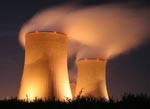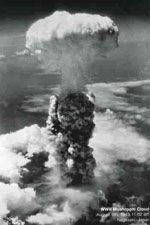News
Grampa at the Ramparts
Jul 29, 2012
 Lest the first month since I began this blog in May 2008 go by without an entry, I hasten to write this one to my limited but select readership. I have spent the last 28 days in Grand Manan, New Brunswick, fixing up a fixer-upper, and ignoring the world’s woes in deference to more personal ones involving faulty plumbing, sagging decks, and paint.
Lest the first month since I began this blog in May 2008 go by without an entry, I hasten to write this one to my limited but select readership. I have spent the last 28 days in Grand Manan, New Brunswick, fixing up a fixer-upper, and ignoring the world’s woes in deference to more personal ones involving faulty plumbing, sagging decks, and paint.
I come home on Saturday to a story in our local newspaper, in the Perspectives section—sort of like the op-ed page in the Times. It features a photo of a dozen people holding up pictures of solar panels. As the story will tell us, they are protesting the continued operation of our local nuclear power plant, Vermont Yankee. The average age of the protestors is 60 or 70. They are protesting a situation the worst aspects of which will probably impact not them but their children and grandchildren, conspicuously absent from the photo.
The headline reads "Renewables Won't Replace Yankee," and the article is written by a standard corporate stooge, this one having worked for 25 years for an electric utility before settling in to a comfy sinecure with a local right-wing don’t-think tank. She qualifies her headline in the second paragraph, when she says that it is "simply not true [that Vermont Yankee will be replaced with renewables], at least in the foreseeable future." [Emphasis added] No one in their right mind expects renewables to fill the gap left by the closing of this ancient, leaking nuclear disaster waiting to happen. In the meanwhile it is managed long-distance by a cabal of perjured executives backed by a federal regulatory commission owned lock, stock, and barrel by the corporatocracy. Vermont wanted to close Vermont Yankee, thought it had the power to do so, and voted overwhelmingly to do so, only to be slapped down by that federal body in servile obsequiousness to its monied masters.
Now old people who should be on the back porch enjoying an iced-tea and a good book are out braving midsummer sunstroke and the scornful but oh-so-well-funded nonsense like this article while their offspring doodle away on Facebook, oblivious to peak oil, climate change, the ozone layer, the third of Americans who are diabetic or prediabetic, the $15.8 trillion we are in debt, our state of endless war, and an economy that has seen a decline in the number of people adequately employed every month for the last four years.
Such obliviousness is not sustainable.
The Day After
Nov 05, 2008
 Let us hope today, which we are writing about on October 25, is not as horrific an aftermath as that depicted in the TV film “The Day After” 25 years ago.1
Let us hope today, which we are writing about on October 25, is not as horrific an aftermath as that depicted in the TV film “The Day After” 25 years ago.1
We have lived under the threat of nuclear annihilation our entire life. How can this world continue to tolerate the anxiety and the threat of these weapons? Some signs point to the possibility that it cannot and will not continue to tolerate them. Most leaders of nuclear nations have expressed interest in reducing the world’s arsenal of nuclear weapons, and the U.S. is actively reducing our own.2 Nevertheless, much remains to be done to move efforts along aimed at zero nuclear weapons in a world where the global development of nuclear power for peaceful purposes is set to expand significantly in the next generation.
The Carnegie Endowment for International Peace has produced a reported entitled Abolishing Nuclear Weapons: Why the United States Should Lead, by George Perkovich. Billed as “Foreign Policy for the Next President,” it sets out “four security interests that would be served by making the long-term project of abolishing nuclear weapons a central purpose of U.S. policy:
- Preventing proliferation
- Preventing nuclear terrorism
- Reducing towards zero the unique threat of nuclear annihilation
- Fostering optimism regarding U.S. global leadership
Difficult or not, it is the ultimate responsibility of the nation that brought nuclear weapons into the world to see that they are ultimately removed.
____________________
1 The Day After (1983) (TV), from IMDB (Accessed October 25, 2008)
2 United States Reducing Nuclear Weapons at an Extraordinary Pace, by Jacquelyn S. Port, from America.gov, April 25, 2008 (Accessed October 25, 2008)
Copyright © 2008 All Together Now.